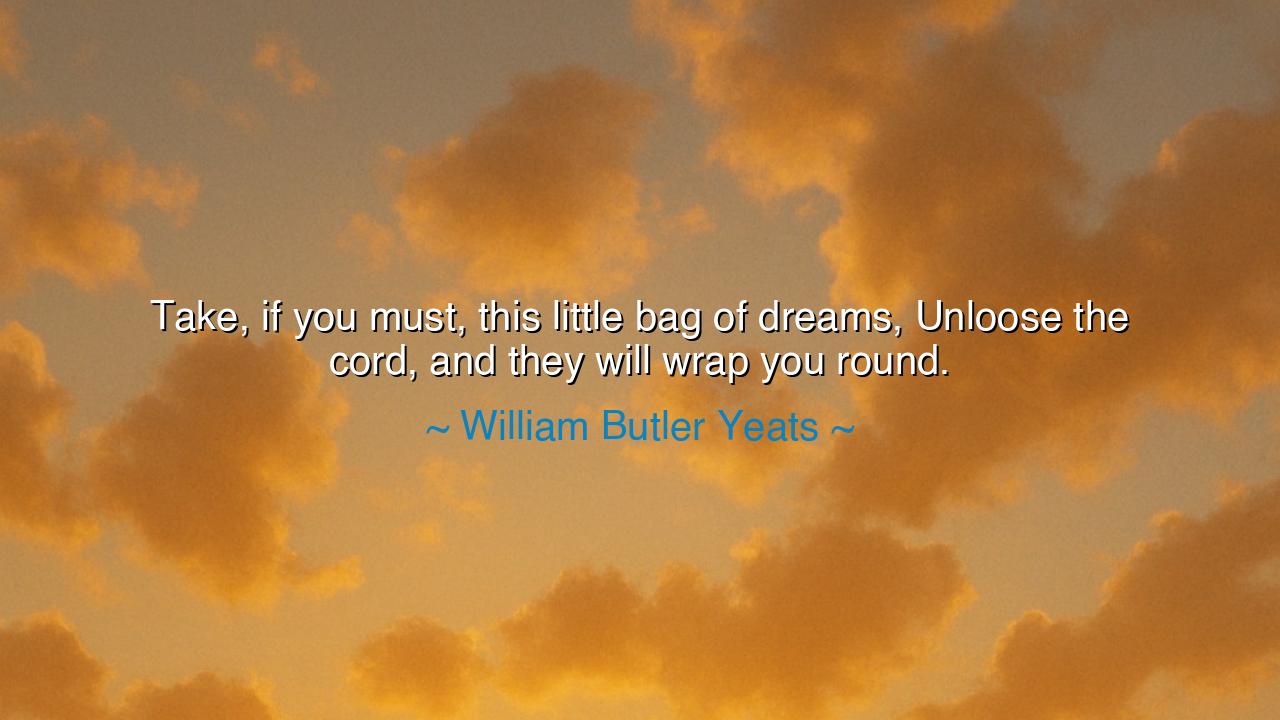
Take, if you must, this little bag of dreams, Unloose the cord
Take, if you must, this little bag of dreams, Unloose the cord, and they will wrap you round.






The words of William Butler Yeats, poet of mysticism and longing, shimmer like moonlight upon the waters of the soul: “Take, if you must, this little bag of dreams, Unloose the cord, and they will wrap you round.” In this tender and haunting image, Yeats gives voice to the eternal offering of the dreamer — the artist, the lover, the seeker — who pours out his inner visions for another to hold. The “bag of dreams” is small, fragile, and humble; yet within it lies the infinite, the essence of imagination itself. He offers it not with pride, but with vulnerability — for to share one’s dreams is to give away the deepest part of oneself.
This line comes from Yeats’s poem “The Cloak, The Boat, and The Shoes”, written in 1899, a time when the poet was steeped in both Celtic myth and personal sorrow. He had spent years pursuing the love of Maud Gonne, the fiery Irish revolutionary who inspired his poetry yet never returned his affection. To her, and to the world that often misunderstood him, Yeats offers this “little bag of dreams.” It is both a gift and a plea: “If you will not take my love, then take my visions — they are all I have left.” His words speak not of defeat, but of the immortal generosity of the creative spirit, which continues to give even when the heart is denied.
In the manner of the ancients, Yeats reminds us that dreams are the sacred breath of the soul. They are woven from the unseen fabric of the spirit — part memory, part desire, part divine whisper. To share a dream is to share the fire of creation itself. The “cord” he speaks of is the boundary between self and other, between what is hidden and what is revealed. When we “unloose the cord,” we allow the dreams of another to flow freely around us, to wrap us round — not to imprison, but to envelop us in understanding, to bind us with beauty. Thus, dreams become a kind of magic — invisible threads of connection that unite one heart with another.
History, too, offers many such dreamers who gave their “little bags of dreams” to the world, not knowing how they would be received. Consider Vincent van Gogh, who painted the heavens ablaze and the fields alive with trembling light. He died poor and unknown, mocked for his visions. Yet today, his dreams wrap the world round in color and compassion, reminding us that even what seems small, even what is rejected, can become immortal. Like Yeats, van Gogh offered his soul through his art; he gave what could not be measured, but only felt. And though the world did not understand him in his time, the cord of his imagination was loosed — and his dreams now live in the hearts of millions.
There is in Yeats’s words also a quiet warning: that dreams, once released, have a life of their own. They are not toys nor trifles, but living forces. When you “unloose the cord,” you invite transformation. To receive another’s dream — a poem, a vision, a love — is to allow yourself to be changed. Dreams do not merely entertain; they wrap you round, altering how you see and who you are. The poet, in his humility, acknowledges this power: his bag may be small, but its contents are vast. The gift of a dream is no less than the gift of awakening.
The lesson is timeless: never underestimate the power of what is small, tender, or unseen. The world often worships grandeur, yet it is the quiet dream that endures — the whispered vision that becomes tomorrow’s truth. Each of us carries a bag of dreams, filled with hopes, talents, and possibilities. Some are buried beneath fear or forgotten beneath routine. But if we dare to open them — to unloose the cord and share them with others — we may discover that our small offering can wrap the world round with meaning. Like Yeats, we must learn the courage of the dreamer: to give freely what is most delicate within us.
So, O seeker of truth, remember this: life is not measured by wealth or acclaim, but by the dreams we dare to share. Let your “bag of dreams” be open — let your imagination spill into the world like light from a broken lantern. And when you encounter the dreams of others, receive them with reverence, for within them lies the divine spark of creation. In this exchange of dreams — this endless giving and receiving of vision — we find the truest form of human connection. For though our hands may be empty, our dreams, once loosed, will forever wrap us round in the golden threads of eternity.






AAdministratorAdministrator
Welcome, honored guests. Please leave a comment, we will respond soon